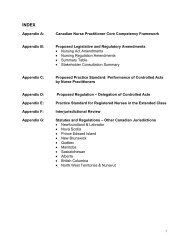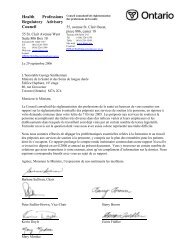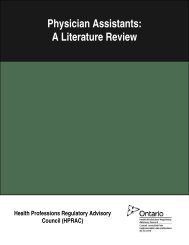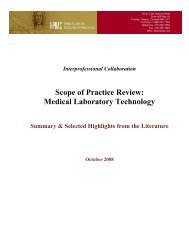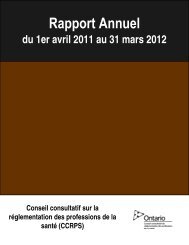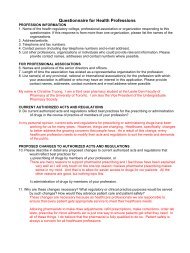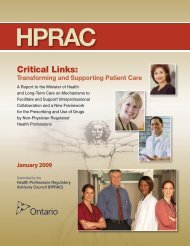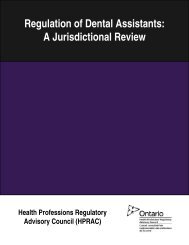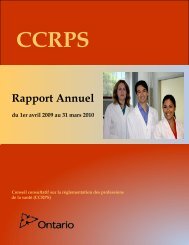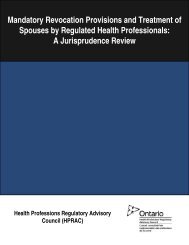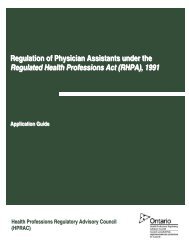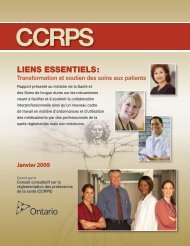Questionnaire for Health Professions
Questionnaire for Health Professions
Questionnaire for Health Professions
You also want an ePaper? Increase the reach of your titles
YUMPU automatically turns print PDFs into web optimized ePapers that Google loves.
<strong>Questionnaire</strong> <strong>for</strong> <strong>Health</strong> <strong>Professions</strong>PROFESSION INFORMATION1. Ontario Dental Hygienists' Association (ODHA)2. 201 – 3425 Harvester Road, Burlington ON L7N 3N1www.odha.on.ca3. 905.681.8883 (phone)905.681.3922 (facsimile)4. Margaret Carter, Executive Directormcarter@odha.on.ca5. List other professions, organizations, or individuals who could provide relevant in<strong>for</strong>mation:College of Dental Hygienists of OntarioFran Richardson, Registrar300 - 69 Bloor Street EastToronto ON M4W 1A9416.961.6234 (phone)registrar@cdho.orgwww.cdho.orgCollege of Registered Dental Hygienists of AlbertaBrenda Walker, Registrar & Chief Administrative Officer206 - 8657 - 51 Avenue NWEdmonton AB T6E 6A8780.465.1756 (phone)780.440.0544 (facsimile)brenda.walker@crdha.cawww.crdha.caCanadian Dental Hygienists AssociationSusan Ziebarth, Executive Director96 Centrepointe DriveOttawa ON K2G 6B1613.224.5515 (phone)613.224.7283 (facsimile)saz@cdha.cawww.cdha.caOntario Dental Hygienists’ AssociationSubmission to HPRAC – Review of Non-Physician Prescribing and Administration of Drugs under the RHPA -- November 2008Page 1 of 13
FOR PROFESSIONAL ASSOCIATIONS6. Names and positions of the senior directors and officersMargaret Detlor, RDHPresident and Regional DirectorShelley Newton, RDHPresident ElectKim Ivan, RDH1 st Vice President and Regional DirectorJocelyne King, RDH2 nd Vice PresidentMelanie Doidge, RDH Regional DirectorKelly-Ann Macknight, RDH Regional DirectorHolly Darby, RDH Regional DirectorMary Jo Poyser, RDH Regional DirectorCatherine Grater-Nakamura, RDH Regional DirectorHeidi Linton, RDH DirectorBev Woods, RDH Director7. Length of time the association has existed as a representative organization <strong>for</strong> theprofession.Established in 1963, the ODHA is a non-profit organization that represents the interestsand needs of member dental hygienists in Ontario. The profession of dental hygiene ispracticed worldwide in more than 50 countries. It has been recognized in Canada <strong>for</strong>more than 50 years. In Ontario alone, there are now more than 10,000 registered dentalhygienists.The ODHA is governed by a Board of Directors of eleven volunteers -- 7 regionaldirectors and 4 directors-at-large. The organizational system, or infrastructure, led byambassadors in 21 districts, allows members to provide input that helps to establishpolicy and direction <strong>for</strong> their professional Association. This way, the Board takes itsdirection from the grassroots - the membership.The ODHA provides a full range of benefits and services that meet members' needs <strong>for</strong>personal and professional growth. These include professional development, networkingopportunities, advocacy, promotion of the profession, personal, professional, andcommercial insurance plans, communication vehicles, and in<strong>for</strong>mation on employmentissues as well as public relations.Dental hygienists are highly skilled in helping clients to attain and maintain optimum oralhealth. As members of the oral health care team, they are responsible <strong>for</strong> professionaltreatment that helps to prevent periodontal disease (gum disease) and dental caries(cavities). They provide a process of care that involves:• assessing the oral condition• planning treatment according to individual needs• implementing the treatment plan, and• evaluating the success of the treatment and planning <strong>for</strong> the future.During the <strong>Health</strong> Legislation Review Process, which preceded the Regulated <strong>Health</strong><strong>Professions</strong> Act (RHPA), it was the ODHA that spoke on behalf of the profession ofdental hygiene. At that time, there were a number of issues regarding the regulation ofdental hygiene that the ODHA hoped would be resolved through self-regulation and,Ontario Dental Hygienists’ AssociationSubmission to HPRAC – Review of Non-Physician Prescribing and Administration of Drugs under the RHPA -- November 2008Page 2 of 13
indeed, self-regulation has given dental hygienists the power to control some aspects oftheir profession including from entry to practice to education, standards of practice anddiscipline. Dental hygiene is unique within the RHPA as being the only profession thatwas previously regulated by another college but now has its own regulatory college.Notwithstanding that dental hygienists have self-regulatory status under the RHPA, thereremain several unresolved areas of concern including the perception that the previousregulating body and/or its members continue to have jurisdiction over aspects of dentalhygiene practice.ODHA is of the opinion that the College of Dental Hygienists of Ontario (College) hasclearly demonstrated its commitment to public protection in the manner in which it hasaddressed self-initiation and strongly believes that the College is in the best position toestablish and en<strong>for</strong>ce the regulations, standards of practice and guidelines <strong>for</strong> thepractice of dental hygiene related to the administration, prescription, compounding anddispensing of drugs.8. List name(s) of any provincial, national, or international association(s) <strong>for</strong> the profession whomay have an interest in this application.British Columbia Dental Hygienists' AssociationCindy Fletcher, Executive Director301 - 9600 Cameron StreetBurnaby BC V3J 7N3604.415.4559 (phone)info@bcdha.bc.caCollege of Registered Dental Hygienists of AlbertaBrenda Walker, Registrar & Chief Administrative Officer206 - 8657 - 51 Avenue NWEdmonton AB T6E 6A8780.465.1756 (phone)brenda.walker@crdha.cawww.crdha.caSaskatchewan Dental Hygienists AssociationBarbara Long, Executive DirectorP.O. Box 25040RPO River Heights7 Assiniboine DriveSaskatoon SK S7K 8B7306.931.7342 (phone)sdha@sasktel.netManitoba Dental Hygienists AssociationMary Bertone, PresidentOntario Dental Hygienists’ AssociationSubmission to HPRAC – Review of Non-Physician Prescribing and Administration of Drugs under the RHPA -- November 2008Page 3 of 13
P.O. Box 25112Winnipeg MB R2V 4C7204.981.7327 (phone)info@mdha.caNew Brunswick Dental Hygienists AssociationAnne Comeau, President506-386-5185 (phone)Nova Scotia Dental Hygienists’ AssociationPatricia Grant, Executive DirectorRegistrar, College of Dental Hygienists of Nova Scotia (CDHNS pending)PO Box 29114, Halifax Shopping Centre RPOHalifax NS B3L 4T8902.444.7241 (phone)info@nsdha.ns.cawww.nsdha.ns.caNewfoundland Dental Hygienists AssociationPennie Fowler, PresidentP.O. Box 28048St. John's NL A1B 4J8nldha@hotmail.comPrince Edward Island Dental Hygienists AssociationNancy McKinnon, Presidentc/o Lynn Wendorf15 Deep River DriveCharlottetown PE C1A 8C4peihygiene@hotmail.comCanadian Dental Hygienists AssociationSusan Ziebarth, Executive Director96 Centrepointe DriveOttawa ON K2G 6B1613.224.5515 (phone)saz@cdha.cawww.cdha.caAmerican Dental Hygienists' Association444 North Michigan Avenue, Suite 3400Chicago IL 60611 USAAnn Battrell, Executive Director312.440.8900 (phone)exec.office@adha.netwww.adha.orgCURRENT AUTHORIZED ACTS AND REGULATIONSOntario Dental Hygienists’ AssociationSubmission to HPRAC – Review of Non-Physician Prescribing and Administration of Drugs under the RHPA -- November 2008Page 4 of 13
9. Do current authorized acts and regulations reflect best practices <strong>for</strong> the prescribing oradministration of drugs in the course of practice of members of your profession?NoPROPOSED CHANGES TO AUTHORIZED ACTS AND REGULATIONS10. Please describe in detail any proposed changes to current authorized acts and regulationsthat would reflect best practices <strong>for</strong>:In order to fully and completely practice dental hygiene and to serve their clients, dentalhygienists need to have the following authorized acts in order to reflect best practice:• Administering a substance by injection or inhalation• Prescribing, dispensing, or compounding a drug as defined in the Drug andPharmacies Regulation Act.In addition, the regulation making authority <strong>for</strong> the College to specify which drugs adental hygienist may use in the course of engaging in the practice of dental hygiene mustinclude the capacity to specify categories of drugs (Dental Hygiene Act, 1991, subparagraph12 (1)(a)).11. Why are these changes necessary? What regulatory or clinical practice purposes would beserved by such changes? How would they advance patient care and patient safety?The changes are necessary so that dental hygienists can provide full treatment to theirclients, especially clients who do not or cannot access a traditional dental office andthose who are in rural or remote areas of the province. This is particularly importantwhere a dental hygienist might be the only accessible oral health practitioner.ODHA is confident that the College will be able to establish the necessary regulations,guidelines, and standards to enable dental hygienists, particularly those in independentpractice, to provide their clients with comprehensive, safe, effective, and timely healthcare.The ability to administer a substance by injection or inhalation will mean thatappropriately qualified dental hygienists will be able to provide full service and facilitatecom<strong>for</strong>t through the administration of nitrous oxide and local anesthesia.12. Are the proposed changes considered part of current routine practice of the profession, andauthorized to members by medical directives, orders, or delegation? Please describe. Ifauthorized by medical directives, orders or delegation, is this approach inadequate orinsufficient? Please explain.ODHA is very concerned about the limitation of the acts authorized to dental hygiene.While the list of controlled acts in the RHPA has been written in broad terms toaccommodate new procedures and techniques over time, dental hygiene’s authorizedacts are very specific. This poses a significant barrier <strong>for</strong> dental hygiene in Ontario withrespect to the administration of pain management such as local anesthetic that isOntario Dental Hygienists’ AssociationSubmission to HPRAC – Review of Non-Physician Prescribing and Administration of Drugs under the RHPA -- November 2008Page 5 of 13
accepted without question in the four western provinces and many jurisdictions in theUnited States.The original intent of the RHPA was to identify those procedures that exhibited asignificant risk of harm and to assign these procedures to regulated health professionals.Contained within the RHPA is the recognition that controlled acts may be providedthrough delegation. While the Ministry of <strong>Health</strong> and Long-Term Care has long promisedpolicy direction on delegation under the RHPA, such has not been <strong>for</strong>thcoming. In theabsence of such direction, many regulatory colleges have developed standards orguidelines on delegation.Within the regulated health professions, it is acknowledged that the delegator isresponsible <strong>for</strong> the decision to delegate the procedure and the regulated healthprofessional receiving the delegation is responsible <strong>for</strong> the appropriateness andper<strong>for</strong>mance of the procedure. ODHA affirms that it is not just a mechanical skill that isrequired in carrying out a controlled act but also judgment and knowledge to identifywhen there is an increased risk factor and knowing how to respond appropriately.Regulated health professionals have standards of practice and stringent qualityassurance requirements and a regulatory framework to ensure recourse.The administration of local anesthesia could be authorized to dental hygiene throughdelegation. Un<strong>for</strong>tunately, the Royal College of Dental Surgeons of Ontario does notpermit its registrants to delegate the administering of local anesthesia to dentalhygienists. It is left up to the dental hygienist to find an appropriately qualified medicalpractitioner who will delegate this act to him or her. It is interesting to note that despitethis barrier, there are a number of dental hygienists who have persevered to obtain sucha delegation. The Royal College of Dental Surgeons of Ontario’s position on delegationenables dentistry to continue to control components of the dental hygiene scope ofpractice and this is scarcely in the public interest. In light of the RCDSO’s refusal to allowdelegation, authorization to dental hygiene remains the only alternative to effectivelyproviding dental hygienists with the authority to administer local anesthesia and/or nitrousoxide.13. Would the proposed changes result in an enhanced or changed scope of practice <strong>for</strong> theprofession?The proposed changes will enhance the scope of practice and enable qualified dentalhygienists to provide comprehensive care to their clients. This is particularly importantwhere the service location is outside the traditional dental office or in a remote or ruralsetting.14. Please describe in detail any changes or additions that would be required to the controlledacts that are now authorized to the profession and what, if any, limitations or conditionsshould be attached to the authorized act.There are no changes required to the current authorized acts <strong>for</strong> dental hygiene.Ontario Dental Hygienists’ AssociationSubmission to HPRAC – Review of Non-Physician Prescribing and Administration of Drugs under the RHPA -- November 2008Page 6 of 13
15. Has the profession submitted a request to the Ministry of <strong>Health</strong> and Long-Term Care <strong>for</strong>changes or additions to the list of drugs that are included in the regulation under theprofession-specific act?There is no drug regulation in place at this time.RISK OF HARM16. What additional risk of harm to the patient or client might result from the proposed changes?How would your profession manage this risk?There is an inherent risk in any of the controlled acts in the RHPA. At a minimum,management of the risks associated with the controlled acts rests with the:• educational curriculum;• overall responsibility of the College to determine the qualifications that a registranthas to possess in order to per<strong>for</strong>m the activity – in some cases there are noadditional qualifications and in others there may be some (<strong>for</strong> example, selfinitiation,restorative dental hygiene);• College regulations, standards of practice, and guidelines;• College quality assurance program;• ODHA professional development opportunities, and• dental hygienists’ own professional obligation to practice within their competency.There is no evidence available that demonstrates that dental hygienists are at higher risk<strong>for</strong> misadventure related to the administration of local anesthesia or nitrous oxide and anypotential risks associated with the administering, prescribing, dispensing, orcompounding drugs will be ameliorated by appropriate education and skill development.Nevertheless, ODHA is mindful of protecting its members and has already recognized thepotential <strong>for</strong> risk associated with self-initiation and independent practice by increasing thecoverage of its malpractice insurance policy.EDUCATION AND CONTINUING COMPETENCY17. How does your profession require demonstration of competencies <strong>for</strong> pharmacotherapy?ODHA supports a model where competencies that are deemed by the College to benecessary <strong>for</strong> practice that are not already an integral part of the current curriculum (asverified by the accreditation standards) are achieved in a manner similar to Alberta. TheAlberta regulatory college has established a course that registrants must successfullycomplete in order obtain a prescriber’s number. The course is structured in modules thatcan be undertaken on-line with required assignments and a proctored examination.The College is able to provide a more fulsome response to this question.Ontario Dental Hygienists’ AssociationSubmission to HPRAC – Review of Non-Physician Prescribing and Administration of Drugs under the RHPA -- November 2008Page 7 of 13
18. Please provide pharmacotherapy course content in the current educational curriculum anddemonstrate how it ensures the minimum qualifications <strong>for</strong> the prescribing or administrationof drugs by members of your profession.The College is able to provide a more fulsome response to this question. In the casewhere there may be competencies that are not covered in the base program, the Collegehas demonstrated its commitment to ensure only qualified dental hygienists areper<strong>for</strong>ming activities in the dental hygiene scope of practice.19. Does the health professional college require continuing education and training <strong>for</strong> membersto ensure competency in the prescribing or administration of drugs? Please be specific andprovide documentation to the extent possible. Please describe how the college ensures itsmembers keep pace with advancements in pharmacotherapy, pharmacology, and patientsafety.The College administers the Quality Assurance Program and requires its registrants todemonstrate that they are maintaining and enhancing their competencies related to theirspecific practice setting. The ODHA facilitates its members’ learning by offering manyprofessional development sessions on pharmacotherapy, pharmacology, and patientsafety. Not only are these opportunities provided at seminars and conferences, there arepharmacology programs available to our members on our on-line learning plat<strong>for</strong>m –DentalProLearn.20. Please indicate what college documents are available to members on the prescribing oradministration of drugs, including relevant standards of practice, rules, and guidelines. Arethese documents current? Please include the documents with the submission.The College is able to provide a more fulsome response to this question.21. Please describe current competencies, education, and training of members of the professionto per<strong>for</strong>m any of the proposed changes.Current accreditation standards require competencies in pharmacology andpharmacotherapy. Where the College determines that the educational curriculum is notsufficient to support the per<strong>for</strong>mance of the authorized act, it has demonstrated that it iscommitted to ensuring that it will require appropriate educational preparation <strong>for</strong> suchactivities.22. Do all members of the profession have the competencies to per<strong>for</strong>m any proposed activityrelated to the prescribing and/or administration of drugs?The College is in the position to determine if additional competencies are required.23. What effect would the proposed change in the prescribing or administration of drugs have onmembers of your profession who are already in practice?It will enable dental hygienists to provide a comprehensive service to their clients. Thosewho are interested in undertaking these new authorized acts would have to satisfy theOntario Dental Hygienists’ AssociationSubmission to HPRAC – Review of Non-Physician Prescribing and Administration of Drugs under the RHPA -- November 2008Page 8 of 13
College that they have successfully attained the required competencies. The ODHAwould assist its members in obtaining and maintaining the required competencies.The proposed changes will:• promote interprofessional collaboration with dentists, periodontists, pedodontists,as well as physicians, nurses, pharmacists, etc.;• increase access to timely oral health care; and• facilitate portability of dental hygienists under the Agreement on Internal Trade.PUBLIC INTEREST24. Describe how the proposed changes are in the public interest.The proposed changes will enable dental hygienists to respond more fulsomely prior tothe arrival of emergency medical personnel in the case of a medical emergency. Forexample, the use of an epi-pen <strong>for</strong> allergic reactions, the administration of nitroglycerine<strong>for</strong> chest pain, the administration of a bronchodilator <strong>for</strong> bronchospasm.The bulk of the Ontario population is getting older. With this trend, there may be manymore people unable to access traditional dental offices who still need and want oralhealth care. Dental hygiene is a portable profession, and many of the dental hygienistswho have established an independent practice since the amendment to the DentalHygiene Act have either focused on a mobile practice or it is a component of theirpractice.Dental hygienists are also seeing clients who might not normally attend a dental practicewhether due to dental phobias or other reasons. With the capacity to administer,prescribe, dispense, or compound a drug, dental hygienists will be able to provide morecomprehensive service to a population not currently accessing care and referring theseclients <strong>for</strong> further care when warranted.In addition, in rural and remote communities in Ontario, where current dentists may becontemplating retirement, and having trouble in transferring their practice, dentalhygienists may become the only oral health practitioners providing service. In thesecases in particular, it is vitally important that dental hygienists have the capacity toadminister, prescribe, dispense, or compound a drug. If dental hygienists don’t have thiscapacity, the health care system may be burdened with unnecessary visits to emergencydepartments or family physicians, or even worse, clients will go without.Some clients who attend an emergency department or physician’s office <strong>for</strong> pain might bemore appropriately seen and treated by an oral health care practitioner. When dentalhygienists are able to administer, prescribe, dispense, or compound a drug, these clientswill not need to wait <strong>for</strong> an emergency room physician or family physician to receive careand appropriate medication.When dental hygienists are able to administer, prescribe, dispense, or compound a drug,clients will be able to have more complete direct access to oral health services. Even inthe traditional dental practice, it will mean that the client does not have to wait <strong>for</strong> theOntario Dental Hygienists’ AssociationSubmission to HPRAC – Review of Non-Physician Prescribing and Administration of Drugs under the RHPA -- November 2008Page 9 of 13
dentist to administer local anesthesia or to write a prescription or dispense a drug. Theresult is a seamless provision of service that is client-centered.25. How would the proposed change affect other health professions? The public?Clients would be able to direct access to dental hygienists <strong>for</strong> oral care. This wouldpotentially reduce the load on other health care providers. Clients would be af<strong>for</strong>dedaccess to care, choice of clinician, with no need <strong>for</strong> double appointments when there is aneed <strong>for</strong> medications that are within the dental hygiene scope of practice.26. Are members of your profession in favour of the proposed changes?Our members have driven this initiative. We engage our members in discussions twice ayear in more than 21 districts in the province. They are all interested in providing the bestpossible care to their clients in all settings within their scope of practice. Our membersrecognize that they do not have to per<strong>for</strong>m the authorized act if their particular practiceenvironment does not require it. They also see many opportunities <strong>for</strong> optimal client carethat are unfulfilled because dental hygienists do not have these authorized acts.PRESCRIBING: DRUG REGULATIONS UNDER PROFESSIONAL ACTS27. Please describe challenges faced by members of the profession as a result of listing specificdrugs in regulation schedules made under the profession-specific act.The current legislative and regulatory regime is too cumbersome and time-consuming toenable regulation change in a timely manner. The advances in drug research anddevelopment, and indeed technology, are far more rapid than the legislative process cancontemplate. It is simply not in the public interest to provide a list of drugs in regulationthat can be administered by a profession. If past experience in obtaining change toregulations is any indicator, it is not likely that even listing categories of drugs with anyspecificity is at all useful.28. If classes of drugs, rather than a list of specific drugs, were included in the proposedregulations, please describe how this would impact the members of the profession and thecollege. What, if any, additional education and training, competency review, or updates toclinical guidelines or standards of practice would be required?ODHA would support only broad categories of drugs being provided in regulation.College would be expected to provide and update the practice guidelines and standardsas practice evolves and it is well positioned to keep abreast of the changing needs of theprofession and its practice.29. If classes of drugs, rather than a list of specific drugs were included in the regulation, whatconditions should be attached, if any, to the classes?Since dental hygienists have to practice within their scope of practice, it would besomewhat redundant to qualify the classes of drugs authorized to the profession.Outlining a broad purpose as something other than the scope of practice statement “theOntario Dental Hygienists’ AssociationSubmission to HPRAC – Review of Non-Physician Prescribing and Administration of Drugs under the RHPA -- November 2008Page 10 of 13
assessment of teeth and adjacent tissue and treatment by preventive and therapeuticmeans and the provision of restorative and orthodontic procedures and services” ispotentially very limiting. The College has a responsibility to provide its registrants withguidance on circumstances, in which they can administer, prescribe, dispense, orcompound a drug and registrants clearly have an obligation to adhere to the College’sguidelines.30. If classes of drugs, rather than a list of specific drugs were included in the regulation, howwould you classify the drugs <strong>for</strong> your profession? Are there circumstances where a drugclass would not be appropriate in a regulation schedule <strong>for</strong> the profession? Are theresituations where a combination of class and list of specific drugs would better respond to thecompetencies of the profession?Our comments <strong>for</strong> question 29 indicate our strong belief that the College is able, and hasdemonstrated its ability, to regulate the profession in the public interest and it is notnecessary to list drugs or categories of drugs in regulation.That having been said, if broad categories are deemed by HPRAC to be necessary thenODHA would suggest the list of categories include, but not necessarily be limited to, thefollowing:• Anti-infectives including antibiotics,antifungals and antivirals• Anti-inflammatories• Anti-allergics including antihistaminics• Sedative hypnotics• Analgesics• Anesthetics• Salivary stimulants• Emergency drugs• Fluoride• Smoking cessation aids31. If applicable, please describe in general your profession’s experience with requests <strong>for</strong>changes to drug regulations, including specifics of the requests made, regulation changesthat followed, if possible the time required <strong>for</strong> changes to regulations, and what, if any,proposed changes were, or were not, approved by government.Our profession has no experience with changing drug regulations.COLLABORATION32. Do members of your profession practice in a collaborative or team environment where achange in drug regulations or legislation would contribute to multidisciplinary health caredelivery? How would relations between professionals working in a team be impacted?The majority of our members practice in a team environment.In a dental practice examples of activities that would benefit the client and team include:• administering local anesthesia means the client would not have to wait <strong>for</strong> thedentist to be available• administering nitrous oxide means a nurse, physician, respiratory therapist ordentist would not have to be presentOntario Dental Hygienists’ AssociationSubmission to HPRAC – Review of Non-Physician Prescribing and Administration of Drugs under the RHPA -- November 2008Page 11 of 13
• administering, prescribing, dispensing, or compounding a drug means the dentalhygienist would be able to follow-through on the care plan and complete in-officetreatment and home care.In mobile and independent practices, the proposed change will enhance collaborationwith other oral health care providers as well as nurses, physicians, and pharmacistsparticularly in long term care homes.What additional standards would be required (e.g., record-keeping, referral protocols)?Please describe any consultation process, agreements, or other arrangements that haveoccurred with other professions.Dental hygienists have well established standards <strong>for</strong> record keeping. The College andODHA are currently working with the Royal College of Dental Surgeons of Ontario andthe Ontario Dental Association to produce in<strong>for</strong>mation <strong>for</strong> our two professions in the areaof recordkeeping.OTHER JURISDICTIONS33. Describe any obligations or agreements on trade and mobility that may be affected by theproposed changes <strong>for</strong> the profession. What are your plans to address any trade/mobilityissues?As this is a regulatory issue, the College is able to provide a more fulsome response tothis question.34. What is the experience in other Canadian jurisdictions? What is the experience ininternational jurisdictions?The Alberta regulatory college has recently implemented an on-line refresher programthat must be completed in order <strong>for</strong> dental hygienists in Alberta to receive a prescribernumber. The American Dental Hygienists' Association is proposing that advanced dentalhygiene practitioners be able to prescribe pharmacologic agents.COSTS AND BENEFITS35. What are the potential costs and benefits to the public and the profession of the proposedchanges?The proposed changes will enable dental hygienists to provide more comprehensive oralhealth care to their clients and may reduce duplication of services.Dental hygienists in independent practice provide the public with:• access (dental hygiene is portable and can go to the client, independent practicesare opening in rural and remote areas),• choice of oral health care provider (clients may choose to access a dentalhygienist independent of their dentist of record), andOntario Dental Hygienists’ AssociationSubmission to HPRAC – Review of Non-Physician Prescribing and Administration of Drugs under the RHPA -- November 2008Page 12 of 13
• af<strong>for</strong>dability (since dental hygiene generally has a smaller overhead, on averagethe dental hygiene fee guide is 30% less than the dental fee guide and dentalhygienists may choose to offer their services at a competitive rate)The proposed changes have the potential to impact on wait-times by reducing therequirement <strong>for</strong> physician and emergency room visits <strong>for</strong> mouth pain. On the other hand,it is also possible that dental hygienists will see clients who would not normally accessthe health care system and who might require referrals to other health care providersincluding oral pathologists, physicians, oncologists, and dentists.Educational institutions may see the proposed changes as opportunities to provideupgrading and/or refresher programs <strong>for</strong> dental hygienists, perhaps in collaboration withcurrent programs in other disciplines.The proposed changes will likely require continued collaboration among the affectedregulatory colleges to enable understanding and implementation of the proposedchanges.The profession will be able to fulfill its potential in the health care system in Ontario.ADDITIONAL INFORMATION36. Is there any other relevant in<strong>for</strong>mation that HPRAC should consider when reviewing yoursubmission?ODHA looks <strong>for</strong>ward to meeting with HPRAC in their follow-up consultation.Ontario Dental Hygienists’ AssociationSubmission to HPRAC – Review of Non-Physician Prescribing and Administration of Drugs under the RHPA -- November 2008Page 13 of 13



